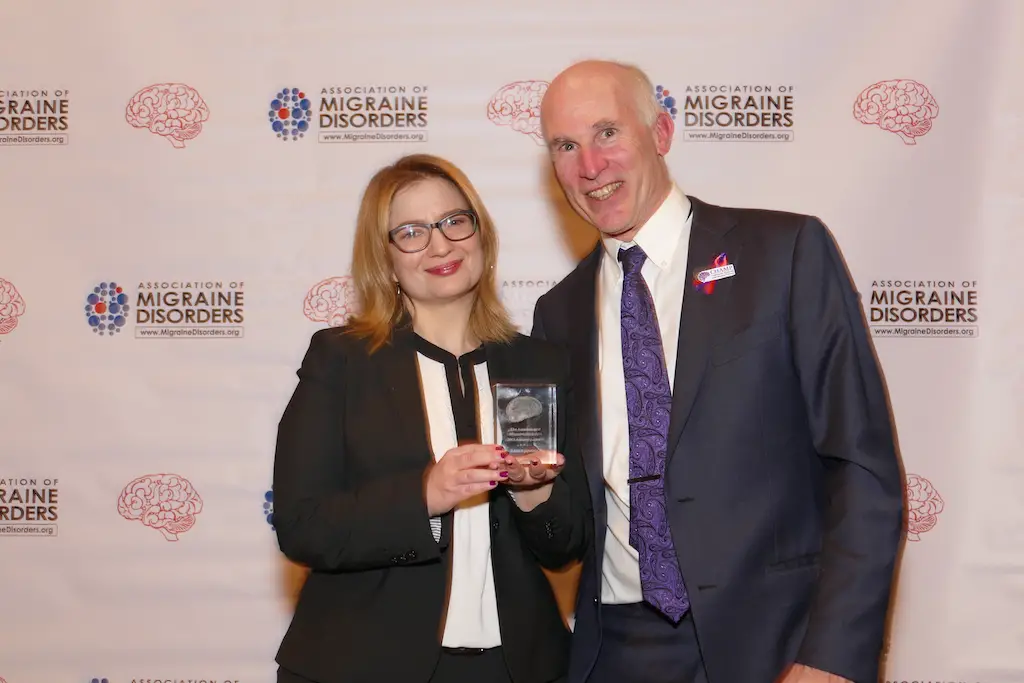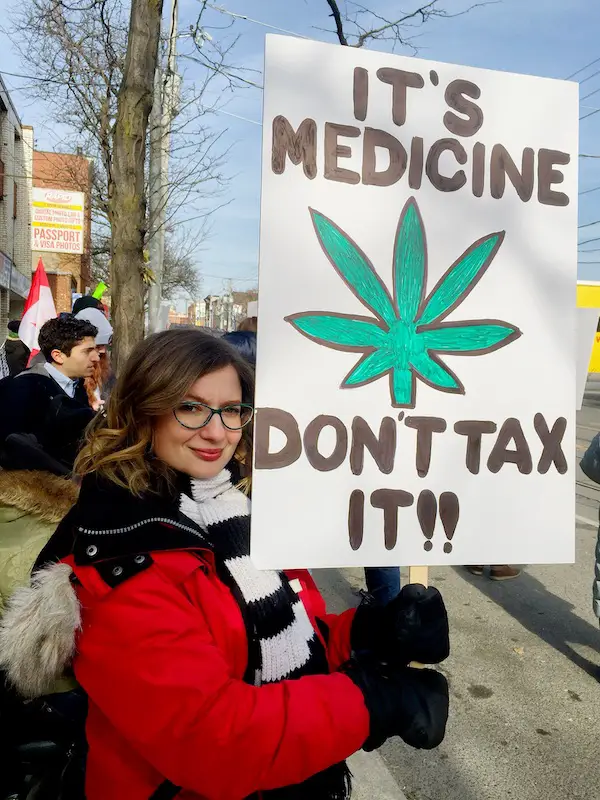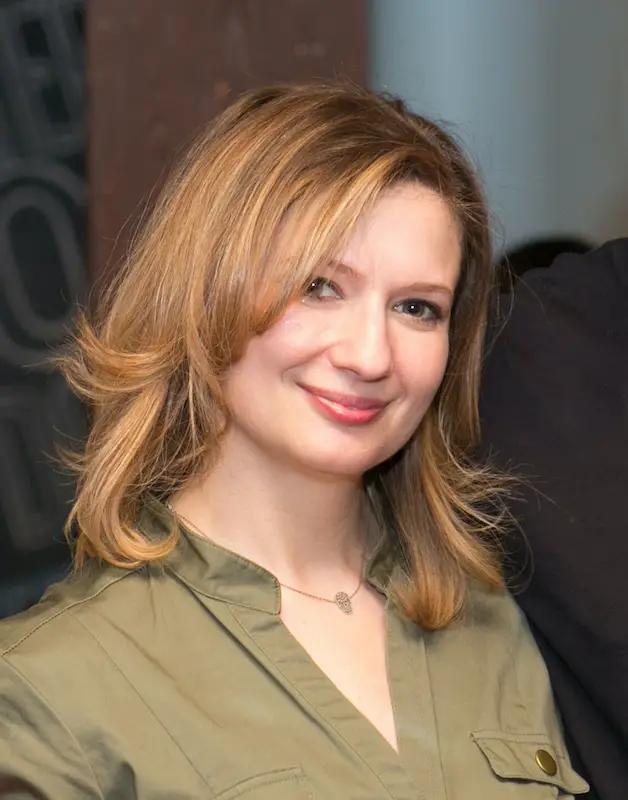Cannabis for migraine is a popular topic in our private Migraine Strong Facebook Group. It falls under the Misc. category of our Treatment Pie. While not everyone in the United States and beyond has legal access to cannabis for migraine, a larger number of patients are gaining access each year and are finding that cannabis has a place in their treatment plan.
Jodie Epstein is a patient advocate and educator from Toronto, Ontario. She is also the Founder of MigraineBuds.com and the private MigraineBuds Chat Facebook Group which discusses all things cannabis and migraine. She created both channels after finding it difficult to obtain information about cannabis that was specific to migraine and to find people to compare experiences.
Jodie’s journey has led to involvement with such organizations as GrowWise Health, CFAMM, the Association of Migraine Disorders and she’s most recently joined the Michener Institute’s Cannabis Education Advisory team.

the Association of Migraine Disorders
Jodie and I met through our mutual pain of migraine in a chronic migraine support group on Facebook. We became fast friends who communicated over Messenger and exchanged ideas for what to try next for migraine. Eventually, we met in person for dinner and a concert with our husbands in Toronto! So much fun!! She is so knowledgeable about cannabis and migraine that I knew I couldn’t pass up a chance to pick her brain for a blog about the topic. I hope all of you enjoy it!!
When did you first know you had migraine?
I was 11 years old and in school when I had my first hemiplegic attack. It was incredibly scary. First I got aura and couldn’t see anything I looked directly at. Then I got aphasia and couldn’t tell my teacher what was happening. When I got to the nurse’s office half of my body went limp and numb. They called my mother and she was the one that told me what I was experiencing.
How long did it take to get an official diagnosis?
Years. These attacks were episodic at the time, about 4-5 times a year. My doctor had given me Imitrex to abort them. We knew it was Migraine but weren’t aware of what type of migraines I was having. Or even that there were different types! I still had to go to the hospital from time to time, but no one ever sent me to a proper Neurologist until much later in life. It wasn’t until they changed and became chronic at age 29 that I received an official diagnosis. Even then the diagnosis kept changing. It was very frustrating.
Have you ever experienced rebound migraine from using too many acute medications?
Yes I have. I was very aware of the risk, but even when I suspected that I was in rebound, my doctors didn’t take it very seriously. I don’t think they were properly educated in how to diagnose medication overuse headache, and I didn’t know for sure that I was in rebound until I was out of it. And I’ve been back in rebound a few times since then.
Did your doctors warn you about rebound migraine before it happened?
The warnings I received came from migraine support groups online. In fact I learned very little from doctors early on in my diagnosis. I had to educate myself. It was frustrating but enlightening and empowering at the same time.
The thing is, we are often advised to take our meds at the first sign of an attack. That if we wait too long, the medication may be less effective or take much longer to work. But we are also told “don’t take too much of this this or this, otherwise you’ll get rebound (medication overuse headache).”
So it becomes quite confusing and we’re forced to decide “is this migraine bad enough to take something??” and then we often let ourselves suffer out of fear.
How did you work your way out of rebound?
The difficult thing is, I didn’t know for sure that I was in rebound until I was out of it. I ended up in the hospital on day 14 of an acute intractable migraine. My meds stopped working and the pain only intensified with everything I tried to take for it. I felt desperate and hopeless. It took 3 days of steroids and morphine to break the cycle, and despite being 5 floors down from my pain management clinic, my Neurologist never came to see me.
I decided enough was enough and that I needed to take control of my own recovery. I was sent home with more opioids but I knew that wasn’t how to get rid of rebound headaches…they weren’t the answer. Instead I took myself off triptans and acute pain medications for 30 days. I realize now that I should have done so with medical supervision, but I wasn’t exactly receiving the best care at the time.
I had to go through withdrawal and rebound migraines at home with my Husband, with nothing but medical cannabis to use for the pain. It was extremely difficult, but every time I wanted to give in and take a pill, my Husband would hand me my vaporizer (this is a dry herb vaporizer, not the kind with chemical additives that are making people ill). I wouldn’t need much… just a couple of puffs and it would help control the pain.
After about 2 weeks, the chronic daily migraine and headaches began to lift until pain free hours turned into days! It was the first time in years I’d experienced pain free days like that. I then had the strength and resolve to undertake a strict migraine elimination diet (Heal Your Headache) that gave me further relief. After a few months on the diet I had reduced my migraines by more than half. I finally felt in control.
This is what led me to become the advocate for Medical Cannabis for migraine that I am today, and also what led me to start the online migraine support group MigraineBuds! I was so excited by the potential of cannabis to help others like myself, and there was nowhere to have discussions with other migraine patients and compare notes.
I do still take acute medications – cannabis is not a cure… but it allows me to take less of them.
What therapies have you used to help manage your migraine?
Almost everything available to me. Preventive and abortive medications, Botox, Nerve Blocks, Nerve Ablation, Mindfulness-Based Chronic Pain Management, CBT, Psychotherapy, Chiropractors, RMT’s, Jaw Specialists, Craniosacral therapy, Acupuncture, Biofeedback, Supplements, Medical Cannabis and Diet.
What led you to become a patient advocate? Especially for patient’s access to cannabis for migraine?
For the reasons listed above, but also because there is so much stigma and misinformation associated with cannabis and cannabis specifically for migraine. I became determined to dispel the myths, find the research we’re so often told doesn’t exist, and empower patients to take a larger role in their own treatment. Each of us should have the right to try any treatment that might improve our quality of life. Legality is a barrier for many, sure. But that doesn’t mean patients in those regions don’t have a voice. I want patients to feel confident in speaking to their doctors about medical cannabis as a treatment option, even when their doctors are skeptical or uncooperative. Don’t give up. Arrive informed. Seek a healthcare provider who is willing to work with you.

How has cannabis helped your migraine? (Any other conditions?)
Cannabis is not a cure. But it has given me another tool to have in my arsenal, along with my triptans, my ice packs, my peppermint oil and my meditation apps. It allows me to reach for something that might help before I escalate to an acute pain medication. Sometimes it helps and sometimes it does not. But more often than not I can count on cannabis (or my CBD oil) to either reduce my pain level or eliminate it altogether at least for a few hours. It also improves my sleep as well as my mood. For others it helps with anxiety, nausea and much more.
Do you take cannabis for acute migraine management or preventively as well?
For myself personally I take cannabis (in many different forms) as an acute treatment. For many other patients in my group it is an incredibly effective preventive. The important thing here to remember is that no two people will experience the same effect from the same product. There is a trial and error component of medicating with cannabis that everyone has to go through to find their ideal form and dosage. And that includes trying various different forms/delivery methods both as a preventive and for acute relief until you find something that works for you. This take patience. It will also depend on what is available to each patient. Not everyone will have access to all forms and doses of cannabis.
Do you feel there is a stigma when it comes to treating migraine with cannabis?
1000%. But it is getting better. Healthcare professionals are hesitant and skeptical (understandably) because we don’t have the amount of scientific evidence stacked in our corner that pharmaceutical drugs do. It’s very difficult to hold clinical trials with cannabis because of all the variables involved. But that doesn’t mean there isn’t any research! There have been more studies on cannabis as a treatment for migraine and headache disorders than most know about. I have a ton of published papers all linked together in one place on our website for anyone who would like to read them. Migrainebuds.com/researchstudies
The other thing we need to fight stigma on is anecdotal evidence. There is an overwhelming amount of lived experience amongst those of us who medicate with cannabis, and some doctors love to discredit that. As patients we’re really not given enough credit for knowing what does and does not help us.
The key is collecting and reporting this data in a way that makes sense. That’s great that Patient X uses cannabis and it helps her migraines. But what form of cannabis is she using? Is this a tested and regulated product? What dosage is she using, and how often? What specific symptoms does it relieve? Did it just reduce pain level or frequency as well? What delivery method is most helpful to her and why? How can we ensure consistency of this effect?
It’s very difficult to conduct a clinical trial with cannabinoids that are not synthetic like some of the products currently on the market (Marinol, Nabilone etc.) because it’s harder to regulate. Each batch of flower or extract can vary depending on the production methods. Legality and funding are also major hurdles when it comes to research.
Education is another reason stigma is so prevalent. Many of our healthcare professionals are not properly trained in cannabinoid medicine. But as time goes on, this is changing. More and more healthcare professionals are receiving training. We now have college and university degrees on cannabis on everything from cultivation to medicine.
Then we have public perception. Patients experience stigma from family, friends and colleagues. It’s quite difficult to overcome, but one has to calmly educate those around them without perpetuating the stereotypes we see all the time. That we are stoners who just want to get high, etc. Most of us just want to function and improve quality of life.
What would you like our audience to know about cannabis and migraine?
- When learning how to medicate with cannabis for Migraine, Go Slow, and be Patient. Not everything will work for you, and occasionally something might make a migraine worse. That’s par for the course. Discontinue use of that product and try something else. Every strain is a little different. Each oil and extract are different. It’s not uncommon to have to try 3 or 4 brands of CBD oil to find one that works for you. What works for one person may not work for another. It’s a trial and error process.
- You shouldn’t feel nervous about asking your doctor for an authorization to use cannabis as medicine. If your doctor does not consent, don’t give up. Consult with another. This is a valid form of therapy for migraine patients.
- Those of us who take cannabis medicinally should never be made to feel any different than someone who is taking pharmaceutical drugs.
- If cannabis is not legal where you live, or migraine is not on the list of qualifying conditions, use your voice! Advocate for it. Get in touch with organizations like Americans for Safe Access (or CFAMM in Canada) to find out how to get involved in making change.
What studies have been done on cannabis and migraine?
The most recent study I’ve seen was a collaboration between the University of Washington and Strainprint, which is an app that allows patients to track their medical cannabis use. They analyzed the data for something like 12,000 tracked sessions and found that cannabis reduced migraine and headache pain by nearly 50%. They also note that there didn’t seem to be any evidence that cannabis causes medication overuse headache. It was a really interesting study!
There have been several others, including a 2017 study conducted in Italy where they found that a combination of THC & CBD yielded slightly better results than amitriptyline, with a 40.4% reduction in attacks.
If you’d like to learn more, we have compiled as many studies as possible on Migraine and Cannabis and compiled them in one convenient place on our website.
Where can we learn more?
You can join us in our Facebook Group Migraine Buds Chat! The gals on the Admin team Liana and Ashlee are super knowledgeable and helpful. I couldn’t run the group without them! You can also learn so much from chatting with the other members and asking what’s working for them.
We also have a website:
MigraineBuds.com
And you can follow us on Twitter or Instagram! @MigraineBuds

In a perfect world, cannabis…
Would be offered as an option to any patient who needs it and they would be properly educated on how to use it. No one would be forced to source it from the illegal market because they would have access to product that is properly tested for cannabinoid potency, terpene profiles, chemical contaminants and heavy metals.
Many thanks to Jodie for this interview! She has a wealth of knowledge on this subject and I highly recommend seeking out her Facebook group and website to learn more about cannabis for migraine.


Thank you for posting this informative article! I have terrible results with standard migraine RX and was recently prescribed Aimovig but if one is under Medicare coverage, the cost is outrageous. I’m still exploring THC and CBD strains and modalities. I appreciate the in depth information given here. Best regards!
So glad you liked it Sarah. I agree that there is definitely a problem with Medicare and the cost of the new meds. I hope you find some relief with cannabis. I’m hoping we can do another even more in depth interview with Jodie in the near future!!
I belong to migraine budchats on Facebook and have been using cannabis for about 2 years after getting caught in the horrible cycle of rebound headaches with Zomig. I was taking 30-60 Zomig a month!! Now I’m down to 3-5! I take edibles 2 to 4 times a month too. It’s been amazing. Thankfully I live in California and it’s easy to buy.
Hi Kathy. That is really great that you were able to get out of rebound and reduce your Zomig intake so dramatically!! Having access is really the key. So glad to hear you are doing better. We love Migraine Buds Chat!!